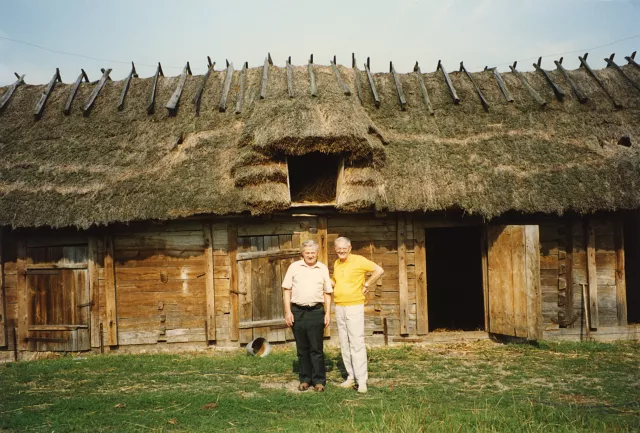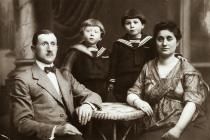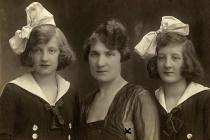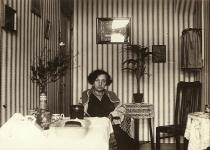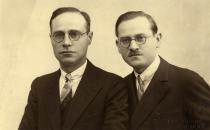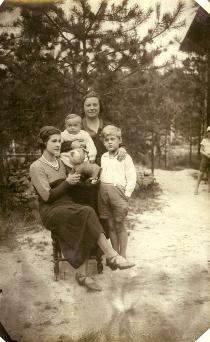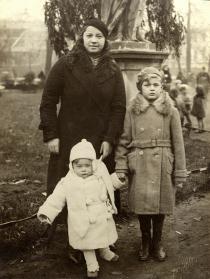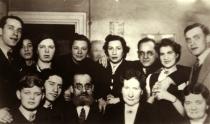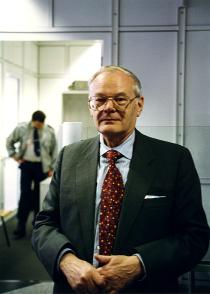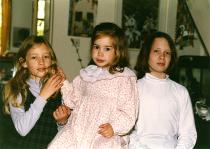This is my and Stasiek - Stanislaw Sliwowski, the man who helped me to hide during the war. The picture was taken in Kowalewszczyzna, the place where I used to hide. We are standing in front of a barn. I visited Stasiek in 1995.
After I ecaped from the ghetto I got to the Bialostockie voivodship, to the area of the town of Sokoly [ca. 220 km north-east of Warsaw]. It was a rather Jewish town before the war. I was told to keep asking farmers, tell them I was from Warsaw and I wanted to get hired as a shepherd. I tried to take side roads, finally at some spot, on some field, I met a plowing farmer, I told him my story, that my parents died during bombing. He agreed to take me in and sent me to his home, and told me to wait until he gets back. It was a farmstead, a shabby house, a huge barn, a cowshed, another house, somehow neater, it turned out that his sister lived in that second house, married, with two children.
It was Stasiek - Stanislaw Sliwowski, 25 years old, an old bachelor. He lived in a village Kowalewszczyzna [10 km east of Sokoly], with an elderly mother and a sister, her married name was Janeczko. I worked for them as a shepherd. Mrs. Janeczko washed my clothes. Stasiek, you could tell right away, was a good man. They used to give me some food for the road, and I would spend almost all day with the cows in a forest.
I still kept going to the forest with the cows. One day, as I was getting ready to go back, the cows stopped all of the sudden in the forest and didn't want to go further. I walked over, looked, there were people in their underwear. I immediately understood, my throat went dry, I said: 'Are you Jewish?' 'Yes.' A married couple with a little girl, two more men and a woman. All together. I said: 'Ikh bin oykh a yid' - 'I am also a Jew'. Which you couldn't do. They started asking questions, I started telling them a little, they asked me where I was staying. I told them that, too.
Stasiek didn't know I was a Jew, but I wasn't behaving right. I never went to any parties, games, I had no contact with boys or girls. I was shy, hidden, isolated. I also didn't go to church and that wasn't good either. I was dazed, depressed, I knew there had been the uprising in the ghetto. People would say: 'Jews are fighting, they're being liquidated…'
Some other time, walking with the cows again, I met a woman with a scarf on her head on the road. She was dressed like local peasant women, but I immediately sensed it, and so did she. She was Jewish, Marysia Olsza, we chatted a little, she told me where she was staying. She worked as a maid. She had to escape from that place after a few days. Later she was hidden at Stasiek's sister's, in the forest. Some other time I was sitting in the pasture with the cows, some guy walked up to me, in a 'maciejowka'- a flat hat with a peak, in tall farmer's boots, he looked like a rich farmer. He talked to me, it turned out he was Marysia Olsza's brother. Perfect Polish. The Olszas were from Sokoly, they knew people in those villages. I think they were very rich before the war.
Stasiek realized I was Jewish by my behavior, and because something was going on with Marysia Olsza. And he came to me once to the field, brought me something to eat, and on the way back he said: 'Wacek, don't worry, I know who you are. You're at my place, everything will be all right.' Later I learned Stasiek had a Jewish fiancé during the war, a girl from Sokoly, he was in love with her, she used to come to him. Stasiek wanted, when there was a ghetto in Sokoly, for her and her parents to live with him, he wanted to build a bunker under the house, and they almost did that, but eventually those people decided to go back to the ghetto.
While herding the cows every once in a while I could see a fire, a glow, I could hear some shots. I knew it meant the Germans found Jews at some farmer's and were burning down the house, the farm, killing the people. From time to time the Germans would come to the village, there was a big post in Sokoly and a big post in Waniewo [10 km east of Sokoly], they would ride bicycles across the village, and if I wasn't out in a pasture with the cows, Stasiek would say: 'Wacek, get inside'. And I would run to the barn, hide, in case one of them came by. Besides, Stasiek wasn't certain of the people in the village.
One day Stasiek called me and said: 'Listen, I can't keep you any more, people in the village are talking, I'm afraid'. But he found me another place. It was early winter 1944. In the evening somebody knocked, a tall man came in, dark hair, dark Jewish complexion, introduced himself as Abram, and took me to the forest. It was quite far, on the way he told me that himself and a few more people sit in a dugout dug in the ground.
